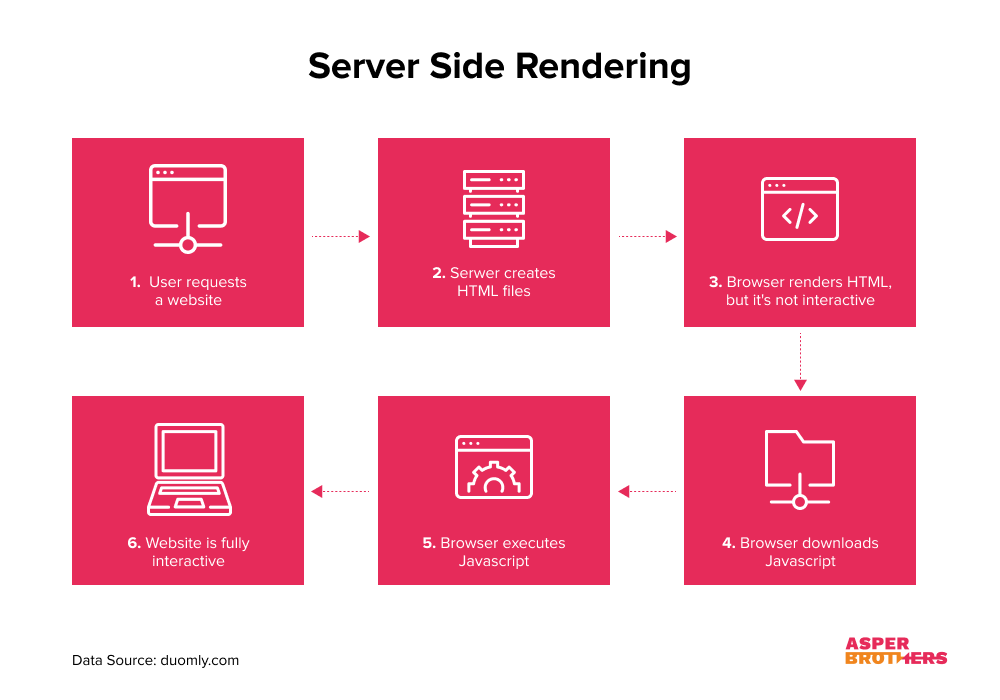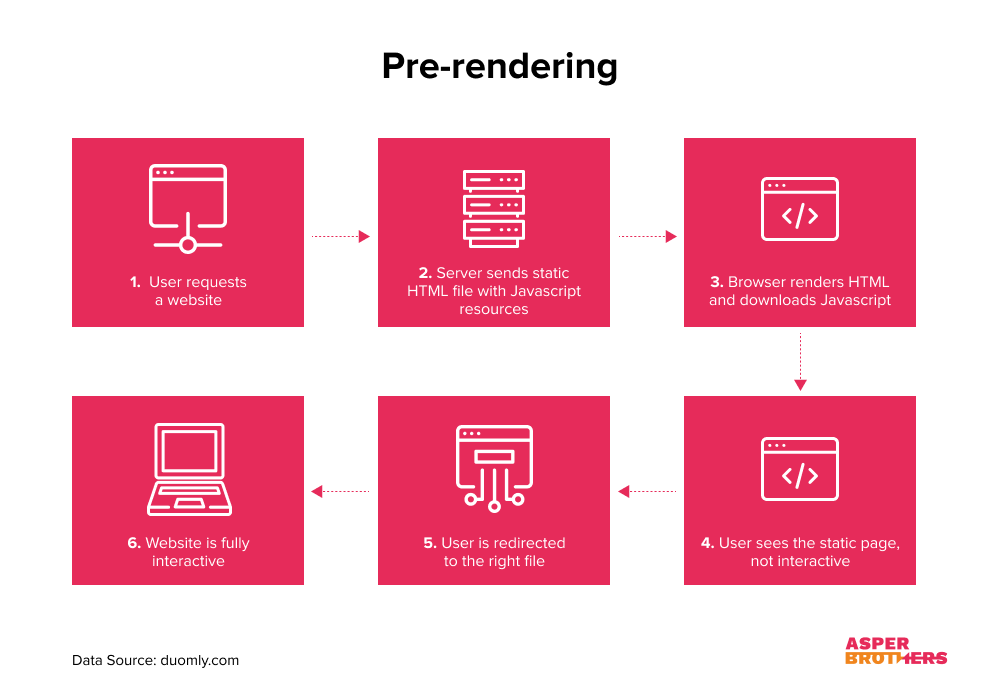Server-Side Rendering in React using Next.js - How it Works & Implementation Example
This gave rise to the client-side rendering process where the browser renders the HTML page by modifying DOM (Document Object...

In this post, we will take a look at strategies for improving the SEO of React websites.
According to a 2020 Stack Overflow survey, React is the most popular web framework among programmers, with more than 60% reporting that they currently use it or have done so in the past.
The reason React is such a popular choice among developers is its high scalability, speed, and simplicity. Reusable components allow for constructing sophisticated UIs without slowing down the development process. The virtual DOM technique in React also allows for faster rendering, resulting in a more effortless UX.
If you want to rank high in Search Engine Result Pages (SERPs), you must make sure that your React website is well-optimized for SEO. According to Google, slow-loading web pages result in high bounce rates – more than half of all mobile site visitors (approx. 53%) leave when a page takes more than 3 seconds to load. This is why Google tends to rank such pages considerably lower.
While React is an excellent choice for developing online applications, its SPA design might provide considerable issues with SEO. Search engines crawlers which navigate and index websites can have difficulty interpreting JavaScript-heavy websites like those built with React.
As a result, React websites may not be properly indexed, resulting in them ranking lower in SERPs.
However, this does not mean that React websites are inherently SEO-unfriendly. There are numerous measures developers may take to guarantee that their React websites are appropriately optimized for search engines.
To learn how to optimize your React website for search engines, it’s important to understand how search engine crawlers work. Crawlers, or spiders, are automated programs that collect information about websites by scanning web pages for keywords, links, and metadata.
Once collected, this data is sent to search engine servers for indexing and ranking. Enhancing the SEO of your website can make it simpler for crawlers to locate and index your material, boosting its exposure in search results in the process.

An overview of Server-Side Rendering.
Most indexing issues Google has with React apps happen across all JavaScript-heavy pages. Let’s go through a list of those most common:
Unintentionally hiding website content from search engines is arguably one of the most serious mistakes that a React developer can make. If important content is generated dynamically and thus hidden behind JavaScript, crawlers will take much longer to find and index it. This may happen if your website uses infinite scrolling, where new content is loaded as the user scrolls down the page, or if you’ve decided to implement lazy loading.
To check if any of your content is hidden behind JavaScript, do the following:
Crawl budget refers to the maximum number of web pages that search engine spiders can crawl in a given period of time, typically five seconds per script.
Because of the aforementioned lengthy loading, parsing and execution of scripts on JavaScript-heavy websites, crawl budget can get quickly depleted. When that happens, search engine crawlers abandon the site before it is fully indexed.
If a JavaScript parser encounters even a single unexpected character, it will stop parsing the current script and display a SyntaxError. This means that a small typo or misplaced character can render the entire script inoperable. If such an error occurs during indexing by the Google bot, it will consider the page empty and index it without any content.
React is a great option for building web applications but its SPA architecture can pose significant SEO challenges. To address this, we now regularly opt to migrate our clients’ web applications to Next.js and Gatsby, which come equipped with server-side rendering and other SEO-friendly features. COO, ASPER BROTHERS Let's Talk
React’s indexing issues can be resolved by building isomorphic (or universal) React apps.
Isomorphic apps can be rendered on both server and client sides, making it possible for the server to bear the initial page load. This approach improves website performance and accessibility for search engine crawlers. To create an isomorphic app, frameworks such as Gatsby and Next.js can be used.
Although building an isomorphic app may require more time, the long-term benefits are worth the investment. Using an isomorphic app ensures that all key content is accessible and that the first-page load is quicker, boosting user experience and raising SERP rankings.
Next.js is a framework for rapidly and easily building apps on the server side with automated code splitting and hot code reloading capabilities. It facilitates rapid and simple development of SEO-friendly single-page applications (SPAs). Next.js fully supports SSR (server-side rendering), meaning that HTML is created for every individual request made. In contrast to typical client-side rendering, server-side rendering generates HTML on the server and then provides pre-generated HTML and CSS files to the browser.
Next.js generates HTML each time the client submits a request to the server. To make SSR work on React, developers must also utilize the Node.js server, which can handle all requests at runtime.
With the built-in SEO optimizations in Next.js, it is easy to create high-performing, SEO-friendly websites.
Gatsby is a free and open-source compiler that assists developers in creating strong and fast websites. Gatsby does not allow for full server-side rendering but produces a static website in advance and then saves the HTML files in the cloud or on the hosting provider’s server.
In the Gatsby.JS framework, SEO can be addressed by creating static web pages. This way, all HTML pages during the build phase are produced in advance and then simply loaded into the browser upon request. All static data can be hosted on any hosting service or in the cloud.
These websites are extremely quick since they are not built at runtime and do not wait for data from a database or API. However, data is only retrieved during the construction process. As a result, if your web app has fresh material, it will not be displayed until another build is executed.
This method works well for programs that do not update data regularly. However, if you want to create a web app that loads hundreds of comments and posts (such as forums or social networks), you might want to choose SSR.
Pre-rendering is the process of creating HTML versions of your website’s pages before serving them to users. Because the HTML contains all of the material, this can ensure that spiders can access all of the key content on your website.
Pre-rendering may be aided by several technologies, like prerender.io and React Snapshot. These tools may be used to build static HTML copies of your React website’s pages, which crawlers can use instead of the JavaScript ones.
Because crawlers may access all of your website’s information, using prerendering can assist with enhancing your website’s indexing and ranking in search engine results pages.

An overview of Pre-Rendering.
React Helmet is a package that lets you manipulate meta tags on your website, such as title tags and meta descriptions, in order to improve your SEO. It may change the meta tags dynamically based on the content of each page, increasing its exposure in search engine results pages.
It may, for example, provide unique meta titles and descriptions to each page of your website, which can boost click-through rates and make them more discoverable to visitors looking for related material.
While React is a popular framework for developing online apps, its SPA design might cause issues with SEO. According to SEMrush, JavaScript appears in 50% of all Top 20 Google search results for popular keywords.
This means that, while search engines can index JavaScript material, relying on it might inadvertently provide issues with search engine rankings.
According to a Builtvisible case study, using server-side rendering (SSR) for a React website resulted in a 50% boost in organic traffic within six months.
The above statistic demonstrates the importance of optimizing your React website for search engines crawlers to improve its visibility and attract more visitors.
To address issues, developers can take several steps to optimize their React websites for search engines. Isomorphic React apps and prerendering can help ensure that crawlers can access all of the important content on your website, improving your website’s indexing and ranking in search engine results pages.
Next.js and Gatsby are popular JavaScript frameworks that support server-side rendering and other SEO-friendly techniques out of the box. By implementing these techniques, developers can ensure that their React websites are SEO-friendly and optimized for search engine visibility.

This gave rise to the client-side rendering process where the browser renders the HTML page by modifying DOM (Document Object...
Regularly auditing your website for technical factors is important to ensure your digital asset is aligned with Google's best practices...
Crawl budget dictates the number of website’s pages that search engines can check within a given time. Although it’s...
Thanks for sharing your thoughts. I really appreciate your effrts and I aam waiting for your further post thanks once again.